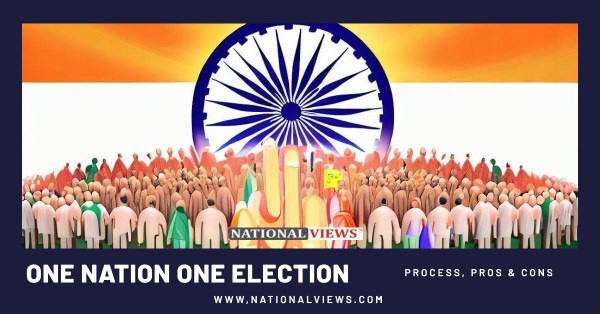One Nation, One Election (ONOE) is a proposal under consideration by the Government of India. Lately, a committee has been constituted under the chairmanship of former President of India Ramnath Kovind along with 7 other members. Let us explore, what is one nation one poll? what is the concept and process? and most importantly what are the pros and cons of this new proposal by GOI.
One Nation, One Election Meaning and Objectives
The concept of “One Nation, One Election” in India refers to the idea of synchronizing the timelines for local, state, and national elections to hold them simultaneously across the country. The primary objective is to streamline the electoral process and reduce the frequency of elections, aiming for greater efficiency and cost savings.
One Nation One Polls Pros and Advantages According to the Proponents
Synchronization: Under ONOE, all elections in India, including those for Panchayats (local bodies), state legislatures, and the Lok Sabha (national parliament), would be held together at predetermined intervals, typically once every five years.
Fixed Electoral Cycle: The proposal suggests establishing a fixed electoral cycle, which means that all elections would be scheduled to occur at the same time. This would eliminate the current practice of staggered elections at different levels of government.
Efficiency: Proponents argue that ONOE would make the electoral process more efficient. It could reduce the logistical and financial burden associated with conducting elections multiple times within a short span, as well as the disruption to governance.
Time and Cost Savings: Conducting multiple elections at different times requires significant resources, including manpower, security, and infrastructure. Synchronizing elections is expected to save both time and money.
Policy Continuity: ONOE aims to promote policy continuity by reducing the frequent changes in leadership that occur at different levels of government due to staggered elections. It could lead to more consistent and stable governance.
Increased Voter Turnout: Some proponents argue that ONOE might lead to increased voter turnout. Voters may be more likely to participate when they don’t have to cast their votes multiple times in quick succession.
Reduced Campaign Fatigue: Frequent elections can lead to campaign fatigue among voters. ONOE could address this issue by reducing the frequency of political campaigns.
Also Read: What will happen in the next round of Assembly Polls in 2023?
One Nation One Elections Cons and Challenges According to the Critics
Federalism in India: India operates as a federal state with a division of powers between the central government and individual states. Each state has its own government, constitution, and legislative authority. This federal structure is designed to accommodate the country’s immense diversity, languages, cultures, and regional needs.
States’ Autonomy: In a federal system, states have a significant degree of autonomy in matters that concern them, including policies, governance, and elections. States often have their own political dynamics, issues, and priorities that may differ from those at the national level.
Synchronization Challenges: The “One Nation, One Election” proposal seeks to hold all elections—local, state, and national—simultaneously. Critics argue that this approach might undermine the autonomy of state governments by aligning their election schedules with that of the central government.
Loss of Regional Focus: Critics fear that if elections are synchronized, state issues and regional concerns may take a back seat to national-level politics. This could lead to a dilution of the ability of state governments to address local issues effectively.
Centralization of Power: Some critics worry that synchronized elections might concentrate power in the hands of the central government, potentially at the expense of state governments. This could undermine the principles of federalism and states’ rights.
Constitutional Implications: Implementing “One Nation, One Election” would require significant changes to the Indian Constitution, as it currently provides for elections to be held at different intervals. Critics argue that such changes could affect the balance of power between the center and states.
Challenges of Representation: Critics also contend that simultaneous elections might not adequately represent the diverse voices and issues of the Indian populace, particularly smaller parties and marginalized communities.
While the idea of “One Nation, One Election” aims to streamline the electoral process in India, the country’s diversity, regional disparities, and complex political landscape pose significant challenges. Critics argue that this proposal could undermine federalism, administrative efficiency, and the representation of diverse voices in the Indian democracy. Therefore, any move towards synchronized elections in India would require careful consideration and a thorough examination of its potential consequences.


